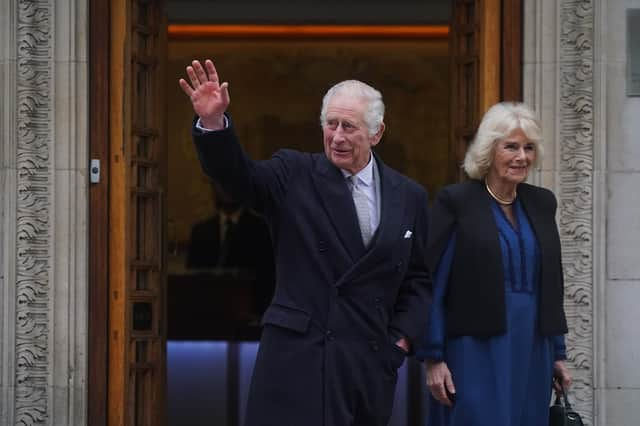Does being king increase risk of bladder cancer? Professor Robert Thomas thinks it could
and live on Freeview channel 276
We don't know yet what the "other cancer" King Charles has been diagnosed with but the most likely explanation is bladder cancer - hopefully at an early stage. His Benign Prostatic Hyperplasia (BPH) and this new cancer are completely independent conditions but there may be a causative link which may also be exacerbated lengthy public duties.
Studies have previously shown that men with BPH have about a 20% increased risk of bladder cancer. The possible explanation for this association is that men with BPH often don't empty the bladder fully. This residual urine in the bladder increases the contact time cells lining the bladder are exposure to toxins excreted in the urine.
Advertisement
Hide AdAdvertisement
Hide AdSome of these toxins, ingested in the diet or absorbed through the lungs, can irritate the urothelial cells causing mutations in their DNA, eventually leading to cancer. Unsurprisingly, although this does not apply to King Charles, this affect is particularly concerning in smokers as the carcinogens in cigarettes eventually get excreted in the urine.


Other studies have clearly shown that people who drink too little, producing more concentrated urine, have a higher risk of bladder cancer. The stronger, yellow, urine increases the exposure of the bladder lining cells to potentially harmful toxins.
Men with BPH tend to have problems holding their water and when they get the urge to "go" they urgently need to rush to the toilet. This urgency is often worse in cold drafty places. Likewise, they often have to get up two to three times at night to use the loo. Either way, men tend to restrict their fluid intake, which makes their urine more concentrated. The additive combination of residual urine in the bladder which is concentrated is particularly concerning.
It always impressed me The King was able to hold his water for so long during lengthy public ceremonies such as The Queens Funeral and his own Coronation. Very likely, during these and many other public events, over the years, he has had to considerably reduce his fluid intake. This begs the question - does being King increase your risk of cancer?
Comment Guidelines
National World encourages reader discussion on our stories. User feedback, insights and back-and-forth exchanges add a rich layer of context to reporting. Please review our Community Guidelines before commenting.
